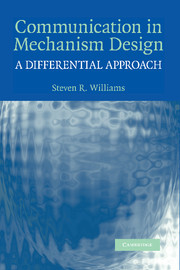4 - Realizing a C∞ Mapping
Published online by Cambridge University Press: 29 May 2010
Summary
Recall from Section 1.1 that a mechanism M realizes a mapping F : Θ → ℝk if ζ (μ (θ)) = F (θ) for all θ ∈ Θ, where μ (θ) is the set of equilibrium messages for θ ∈ Θ, and ζ is the outcome mapping of M. The revelation mechanism and the parameter transfer mechanisms discussed in Section 1.1 demonstrate that there always exist mechanisms that realize a given mapping F. These mechanisms, however, require all but at most one of the n agents to transfer their private information to the message space. Given these rather coarse solutions to the problem of realization, the question becomes the following: Is it possible to exploit the particular features of a given mapping F in order to construct a mechanism that economizes on the amount of information that the agents transfer to the message space in order to realize F?
This question originates in the case in which the mapping F specifies a Pareto optimal allocation of private goods for n agents in an economy. The private information of any single agent (e.g., a consumer's preferences, or the cost function of a firm) can be quite complicated, and yet the agents manage to achieve a Pareto optimal allocation by communicating in a market using the relatively small set of signals consisting of prices and proposed trades.
Information
- Type
- Chapter
- Information
- Communication in Mechanism DesignA Differential Approach, pp. 125 - 190Publisher: Cambridge University PressPrint publication year: 2008
